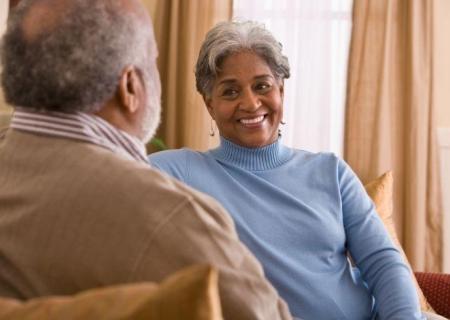
As an asylum seeker at a young age along with her family, Rhoda talks about her feelings of loneliness and the effects of culture change when she arrived in the UK. She has support and love from her husband and children and went to university, as well as joined volunteer groups that help other asylum-seekers.
I’m Rhoda, I’m 28 and I live with my husband and two young children in Doncaster. I work in customer service and I’m studying Project Management. I’m originally from Nigeria and experienced loneliness and isolation when I arrived in the UK as an asylum seeker in my teens.
When I arrived in the UK with my family, integrating into the community was a long, painful and lonely experience and I struggled with my mental health. Finding someone to listen to me, not necessarily to understand, but to hear my story made a huge difference.
As an asylum seeker, I felt significant loneliness. When we were in London we lived in a hostel with other asylum seekers, so we had shared experiences and a sense of solidarity. Things got worse when we arrived in Sheffield and began to integrate into the community. It was a reminder of just how different our life was.
Mixing with different people who have no comprehension of your experiences can feel very lonely. I went to college and I was the only asylum seeker there. I’m Black and I experienced racism too.
Stressful and struggling
I had so much going on in my life. I felt so alone and was struggling so much, including supporting my sister and trying to keep up appointments at the Home Office. When I missed appointments, I’d get a letter saying I would be detained. At that time, I was still a child and the letters made me feel like they were coming to get me. It was so stressful and I was struggling. But I didn’t have time to think about my mental health. You just get on with it.
We couldn’t talk to anyone.
Someone on your side
I felt alone the whole time. I was being bullied but didn’t feel I had anyone to talk to - not even my mother because she had so much going on herself. I was blessed to have Maggie in my life. She was a wonderful woman. She was a support teacher at college and I would go to her every week and talk to her about what was going on. Those conversations helped me a lot because for the first time I felt like I had someone there to support me. There was no way Maggie could understand - but she could listen and support me.
Maggie was on my side and fought for me. When I turned 18, I was told I couldn’t continue at college because at the time I didn’t have a status in the country and so my education wouldn’t be funded. I was told to find tuition elsewhere, but Maggie fought for me and then the school gave me a bursary.
I heard ‘no’ and ‘you can’t’ a lot. I wanted to be a journalist and teachers told me I couldn’t because I didn’t know English as my first language and because I wasn’t born here. I wanted to go to University but I couldn’t because there was no scholarship. I saw the friends I’d made move away and on to uni and towards their futures, while I had to stay at home.
As an asylum seeker, I wasn’t allowed to work. We were living on vouchers and using a food bank. But throughout it all, I volunteered. I volunteered at food banks and refugee centres. Keeping busy really helped me. And when I got my papers, I started working straight away.
I’m not someone who thinks about what other people have. I have always been satisfied with what I have and who I am, and that helps me to keep my cool.
Look to the future
I’m not alone, I just feel a bit lonely sometimes. I have people around me and I have family around me. I trust God and that works for me. When I feel lonely I either pray or think about my future. It’s not helpful for me to think of the past, so I think about my future and what I want from my future and my worth through what I need to make it happen. I read whatever I need to read, I watch whatever I need to watch and I calculate whatever I need to calculate.
I am proud of what I have achieved - I did go to university, I have a wonderful husband and children and I continue to volunteer to help other refugees and asylum seekers.
If people feel lonely they should speak to someone. Find someone you trust and tell them how you feel. That person may not understand, but they will listen. And from my experience, when you feel lonely sometimes you just want someone to listen back. You don’t need lots back - I didn’t always need advice - I just needed someone to listen as I talked things through and found solutions myself.
If you feel affected by the content you have read, please see our get help page for support.

Read stories about people like you

Help us to help you
Make a donation
If you found Rhoda's story helpful and you would like to make a contribution to improving mental health for future generations, please consider a donation.
Donate now